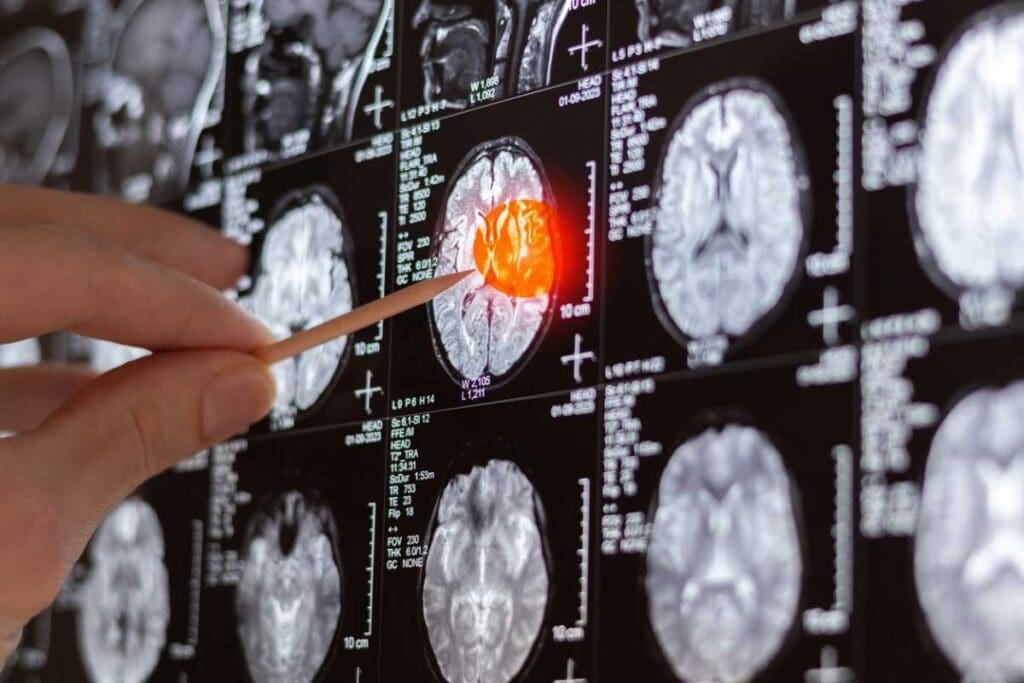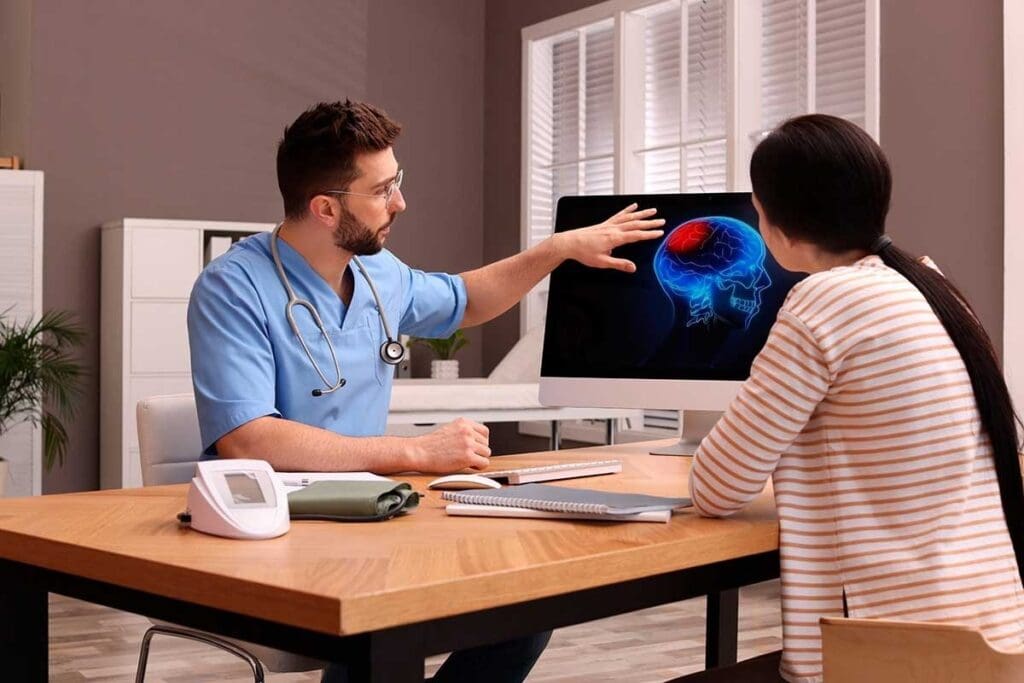
It’s important to know the symptoms of a tumor in the cerebellum to get help quickly. The cerebellum helps us move and stay balanced. Tumors here can really affect how we live.
A tumor in the cerebellum can lead to many symptoms. These include trouble balancing, poor coordination, feeling dizzy, and headaches. Spotting these cerebellar tumor symptoms early can greatly improve treatment results.
At Liv Hospital, we focus on how tumors in different brain regions cause symptoms. Our team works hard to provide full care and support to patients experiencing cerebellum brain tumor symptoms.
Key Takeaways
- Early recognition of cerebellum tumor symptoms is vital.
- Symptoms vary based on the tumor’s location and size.
- Loss of balance and coordination are common symptoms.
- Understanding the impact of tumors on different brain regions is key.
- Liv Hospital provides full care for patients with cerebellum tumors.
Understanding Brain Tumors and Their Regional Effects

Brain tumors are complex and can affect the brain in different ways. This depends on their type and where they are located. We will look at the different types of brain tumors, how common they are, and how their location affects symptoms.
Types of Brain Tumors and Their Prevalence
Brain tumors are divided into two main types: benign and malignant. Benign tumors are non-cancerous and grow slowly. Malignant tumors are cancerous and grow fast. The American Brain Tumor Association says the most common types include:
- Meningioma: A tumor in the meninges, which protect the brain and spinal cord.
- Glioma: A tumor from the brain’s glial cells, which support neurons.
- Acoustic Neuroma: A benign tumor on the nerve from the inner ear to the brain.
- Pituitary Adenoma: A tumor in the pituitary gland at the brain’s base.
Knowing how common these tumors are is key to diagnosis and treatment. For example, meningiomas are more common in women and increase with age.
How Tumor Location Determines Symptoms
The location of a brain tumor greatly affects symptoms. Tumors can occur in different parts of the brain, each with unique functions. For example:
- Tumors in the cerebellum can affect balance and coordination.
- Tumors in the frontal lobe can impact personality, behavior, and motor skills.
- Tumors in the temporal lobe can affect memory, language, and hearing.
Symptoms caused by a brain tumor depend on where the tumor is. A tumor on the left side can cause different symptoms than one on the right.
General Warning Signs of Brain Tumors
While symptoms can vary by location, there are general signs of a brain tumor. These include:
- Headaches that get worse over time.
- Seizures, even if you’ve never had them before.
- Nausea and vomiting, often in the morning.
- Vision changes, like blurred vision or double vision.
If you or someone you know has these symptoms, seek medical help. Early diagnosis and treatment can greatly improve outcomes for brain tumor patients.
Cerebellum Brain Tumor Symptoms: Balance and Coordination Issues

Tumors in the cerebellum can greatly affect balance and coordination. The cerebellum is at the brain’s base and controls movement. A tumor here can cause serious symptoms.
Loss of Balance and Coordination
One key symptom is losing balance and coordination. People might find it hard to walk or do fine motor tasks. This can happen slowly, based on the tumor’s size and growth.
As the tumor grows, stumbling or trouble with precise tasks like buttoning can increase. This is because the tumor messes with the cerebellum’s motor control.
Dizziness and Vertigo
Dizziness and vertigo are common in cerebellum tumor patients. The tumor can mess with the cerebellum’s link to the vestibular system. This system helps with balance and spatial awareness.
People might feel like they or things around them are spinning. This can be very confusing. Sometimes, it can cause nausea or vomiting, making things worse.
Changes in Gait and Posture
Tumors in the cerebellum can also change how people walk and stand. The tumor affects the cerebellum’s motor control areas. This can make people stand wider or walk with a stagger.
At first, these changes might be small. But as the tumor grows, they become more obvious. In some cases, these changes can make everyday activities hard or even make it hard to stand without help.
Additional Cerebellar Tumor Manifestations
Cerebellar tumors can cause many symptoms, not just balance and coordination problems. These symptoms can really affect a person’s life and health.
Nausea and Vomiting
Nausea and vomiting are common with cerebellar tumors. They happen because the tumor puts pressure on the brain. The Brain Tumour Charity says the tumor’s location affects symptoms.
Managing nausea and vomiting is key to keeping patients healthy. “Nausea and vomiting are not just uncomfortable; they can lead to dehydration and malnutrition if not properly managed,” healthcare experts say.
Difficulty with Fine Motor Skills
Cerebellar tumors can mess with fine motor skills. This makes it hard to do precise tasks like writing or tying shoelaces. The cerebellum helps with these movements, and tumors can disrupt them.
Headaches Specific to Cerebellar Tumors
Headaches are common with brain tumors, including cerebellar ones. They happen because the tumor increases brain pressure. The headaches can get worse in the morning or when changing positions.
Patients with persistent or severe headaches need to see a doctor. These could be signs of a serious issue like a cerebellar tumor.
Temporal Lobe Tumor Symptoms and Signs
A tumor in the temporal lobe can change how we think and remember. It affects memory and hearing. The temporal lobe is key for processing sounds, memories, and language.
Memory Loss and Cognitive Changes
Temporal lobe tumors can lead to memory loss and other thinking problems. People might find it hard to make new memories or remember old ones. This happens because the tumor presses on nearby brain areas.
Some common thinking changes include:
- Struggling to learn new things
- Forgetting recent events or talks
- Feeling confused and lost
Hearing Difficulties
Hearing difficulties are a sign of temporal lobe tumors. The temporal lobe handles sound processing. A tumor here can mess with our hearing.
| Symptom | Description |
| Hearing Loss | Partial or complete loss of hearing in one or both ears |
| Tinnitus | Ringing or other noises in the ears when no external sound is present |
| Auditory Hallucinations | Hearing sounds or voices that are not actually present |
Language Processing Problems
Temporal lobe tumors can cause language processing problems. This might show up as trouble finding words, understanding speech, or keeping up with conversations.
Some specific language issues include:
- Difficulty with word retrieval
- Problems with complex sentence understanding
- Struggling to keep up with fast speech
Left Temporal Lobe Tumor Specific Presentations
The left temporal lobe is key for memory and language. Tumors here can cause big problems. They affect how we think and talk.
Word Recall Difficulties
One big symptom is trouble remembering words. People might find it hard to say what they mean. This makes talking and getting ideas across tough.
Short-Term Memory Impairment
These tumors also mess with short-term memory. It’s hard to remember new things or names. This can really mess up daily life.
Speech and Comprehension Issues
Also, there are problems with speaking and understanding. It’s hard to follow what others say or to say what you mean. This affects how we connect with others.
Knowing about these symptoms is key for early treatment. We work hard to help patients overcome these challenges. This way, we can improve their lives.
Frontal Lobe Brain Tumor Symptoms
Tumors in the frontal lobe can cause many symptoms. These include changes in personality and behavior, and problems with judgment and motor skills. The frontal lobe handles important brain functions like decision-making and motor control. A tumor here can greatly affect a person’s life.
Personality and Behavior Changes
One key symptom of frontal lobe tumors is changes in personality or behavior. People might become more impulsive, aggressive, or apathetic. They may act in ways that are not typical for them, like becoming more shy or outgoing.
These changes can be hard for both the person and their family.
Impaired Judgment and Decision Making
Frontal lobe tumors can also affect judgment and decision-making. This makes it hard to solve problems and think critically. It can make everyday tasks difficult.
Loss of Smell and Motor Weakness
Some tumors can cause a loss of smell (anosmia). This happens because of the tumor’s location. Motor weakness is another symptom, as the frontal lobe controls movement. This weakness can affect any body part, depending on the tumor’s location.
If you’re experiencing these symptoms, you should see a doctor. Early treatment can greatly improve outcomes for frontal lobe brain tumor patients.
Occipital Lobe Brain Tumor Warning Signs
The occipital lobe is key for processing what we see. Tumors here can cause visual problems. These issues affect how we see and understand the world around us.
Visual Field Defects
Visual field defects are a common sign of an occipital lobe tumor. These defects can cause blind spots or loss of side vision. They can make everyday tasks hard, like walking or reading.
Visual Hallucinations
Visual hallucinations are another symptom. These are things we see that aren’t really there. They can be simple lights or complex images. The type of hallucination depends on the tumor’s size and location.
Difficulty with Visual Recognition
Having trouble recognizing things is also a sign. It might be hard to know who someone is or what something is. This is called visual agnosia and can be very upsetting.
If you notice these symptoms, it’s important to see a doctor. Early treatment can make a big difference.
Parietal Lobe Tumor Symptoms
Parietal lobe tumors can be challenging because they affect how we see space, feel sensations, and think. These tumors can make everyday life harder and affect our ability to do simple tasks.
Difficulty Understanding Spatial Relationships
One big symptom of these tumors is trouble understanding where things are in space. This might make it hard to move around or judge how far apart things are.
People with these tumors might find it tough to:
- See depth properly
- Coordinate their hands and eyes
- Do tasks that need them to know where things are, like parking or reaching for things
Numbness and Sensory Changes
Numbness and changes in how we feel things are common symptoms. The parietal lobe helps us feel touch, temperature, and pain from our bodies.
When tumors disrupt this, people might feel:
- Numbness or tingling in different parts of their body
- Changes in how they feel touch, temperature, or pain
- It hard to tell the difference between different textures or feelings
Problems with Reading and Writing
Tumors in this area can also make reading and writing hard. This is because the tumor affects the angular gyrus, a key area for these skills.
People might struggle with:
- Reading, known as dyslexia
- Writing, known as agraphia
- Doing math
Knowing these symptoms is key to diagnosing and treating parietal lobe tumors. Next, we’ll summarize the main symptoms of these tumors.
| Symptom Category | Specific Symptoms |
| Spatial Relationship Difficulties | Depth perception issues, hand-eye coordination problems, trouble navigating spaces |
| Numbness and Sensory Changes | Numbness, tingling, altered sensitivity to touch, temperature, or pain |
| Reading and Writing Problems | Dyslexia, agraphia, difficulty with mathematical calculations |
Brain Stem Tumor Symptoms and Their Severity
Tumors in the brain stem can cause serious and potentially deadly symptoms. The brain stem connects the cerebrum to the spinal cord. It controls important functions like breathing, heart rate, and blood pressure.
Cranial Nerve Dysfunction
Brain stem tumors can harm cranial nerves. These nerves handle eye movements, facial expressions, hearing, and swallowing. A tumor can cause symptoms like:
- Difficulty with eye movements or double vision
- Facial weakness or paralysis
- Hearing loss or tinnitus
- Swallowing difficulties or dysphagia
Breathing and Heart Rate Abnormalities
The brain stem controls our breathing and heart rate. Tumors can disrupt these functions, causing symptoms like:
- Irregular breathing patterns or respiratory failure
- Abnormal heart rates or arrhythmias
- Changes in blood pressure
These symptoms are serious and need immediate medical help.
Swallowing and Speech Difficulties
Brain stem tumors can also affect swallowing and speech. Patients may have trouble swallowing or speaking. They might notice changes in voice quality or tone.
- Difficulty swallowing (dysphagia) or speaking (dysarthria)
- Changes in voice quality or tone
- Increased risk of aspiration or choking
These symptoms show how serious brain stem tumors are. It’s important to get medical help quickly. Experienced doctors are key in managing these tumors.
Conclusion: When to Seek Medical Attention for Brain Tumor Symptoms
It’s key to spot brain tumor symptoms early for better treatment. We’ve looked at signs for tumors in different brain parts, like the cerebellum and brain stem.
Knowing brain tumor symptoms and where they happen can guide you. If you have ongoing or serious issues like balance problems, dizziness, memory loss, or vision changes, see a doctor.
Spotting brain tumors early can greatly help treatment. It’s vital to know what is the symptoms for brain tumor and act fast if you or someone you know shows these signs.
Knowing when to seek medical attention is critical. We urge you to look after your health by staying informed and getting medical help for any unusual or lasting symptoms.
FAQ
What are the common symptoms of a cerebellum brain tumor?
Symptoms include loss of balance and coordination. You might also feel dizzy or have vertigo. Changes in how you walk or stand are common. Nausea, vomiting, and trouble with fine motor skills are also symptoms.
How do temporal lobe tumors affect memory and cognition?
These tumors can lead to memory loss and changes in thinking. You might struggle to recall words or have short-term memory problems. Speech and understanding can also be affected.
What are the symptoms of a frontal lobe brain tumor?
Symptoms include changes in personality and behavior. You might have trouble making decisions or judging things. Loss of smell and motor weakness are also signs.
What are the warning signs of an occipital lobe brain tumor?
Warning signs include visual field defects and visual hallucinations. You might also have trouble recognizing what you see.
How do parietal lobe tumors affect spatial relationships and sensation?
These tumors can make it hard to understand where things are in space. You might feel numb or have sensory changes. Reading and writing can also be difficult.
What are the symptoms of a brain stem tumor?
Symptoms include problems with cranial nerves. You might have issues with breathing or heart rate. Swallowing and speech can also be affected.
Can a brain tumor cause dizziness and vertigo?
Yes, tumors in the cerebellum can cause dizziness and vertigo. This is because they affect balance and coordination.
How do left temporal lobe tumors differ in their symptoms?
Left temporal lobe tumors can cause specific problems. You might struggle to recall words or have short-term memory issues. Speech and comprehension can also be affected.
Are headaches a common symptom of cerebellar tumors?
Yes, headaches are common. They often happen because of increased pressure in the brain caused by the tumor.
What should I do if I’m experiencing symptoms that could be related to a brain tumor?
If you’re experiencing unusual or persistent symptoms, seek medical attention right away. It’s important to get checked out.
References:
- Tawil, S., & Shakkour, Z. A. (2020). Cerebellar Ataxia, Nystagmus, and Dysarthria in Neurological Disorders: A Neuroanatomical Perspective. Cerebellum & Ataxias, 7(1), 1-13.
https://cerebellumandataxias.biomedcentral.com/articles/10.1186/s40673-020-00109-3
- Meyers, S. P., & O’Reilly, M. A. (2021). Primary Pediatric Posterior Fossa Tumors: Clinical Features, Imaging, and Differential Diagnosis. Neuroimaging Clinics of North America, 31(4), 543–573.https://www.sciencedirect.com/science/article/pii/S105251492100067X








